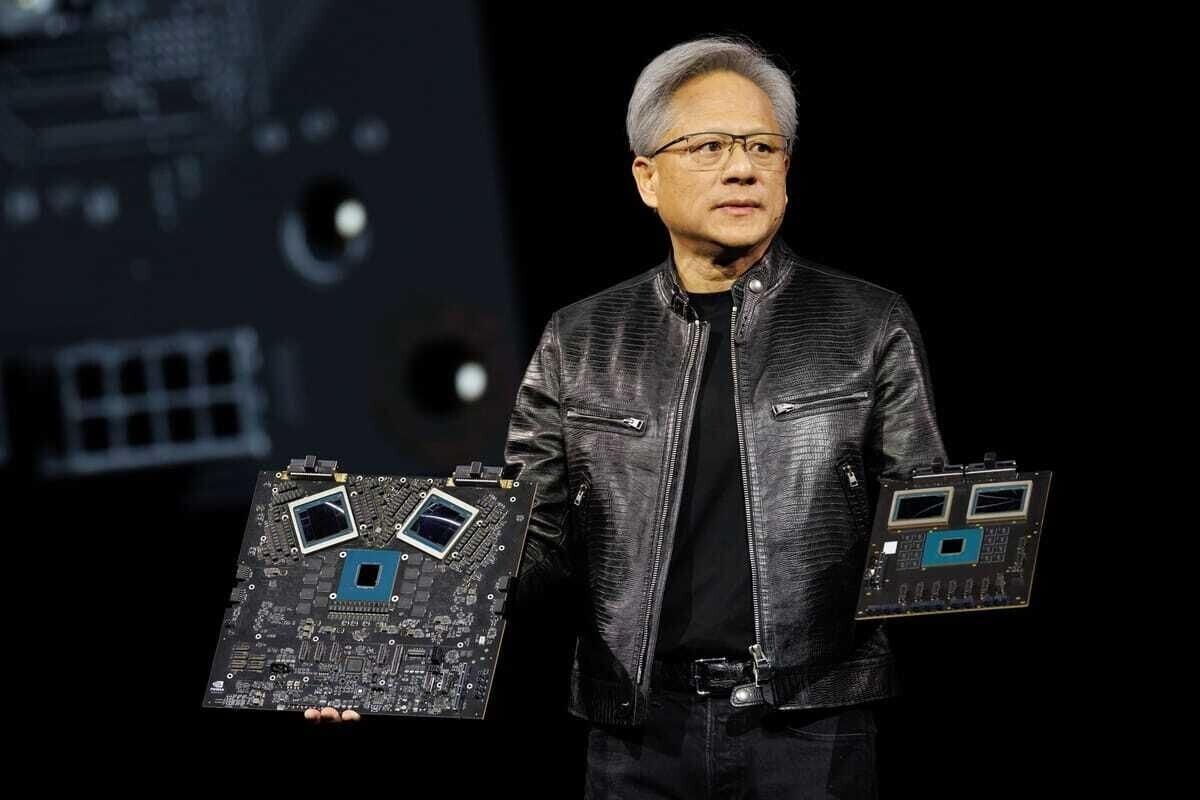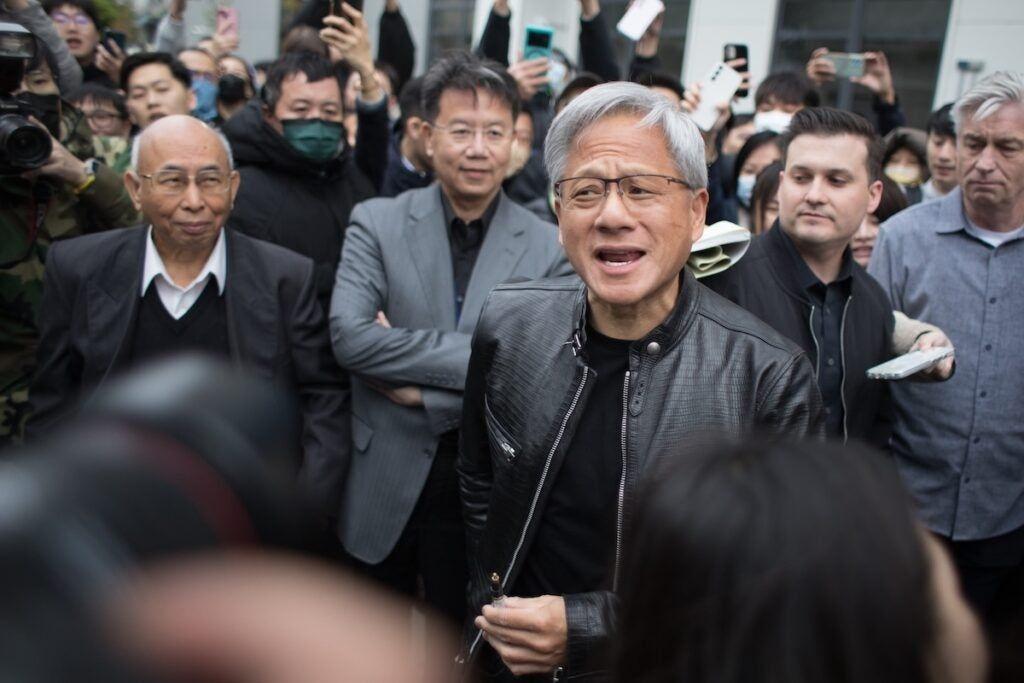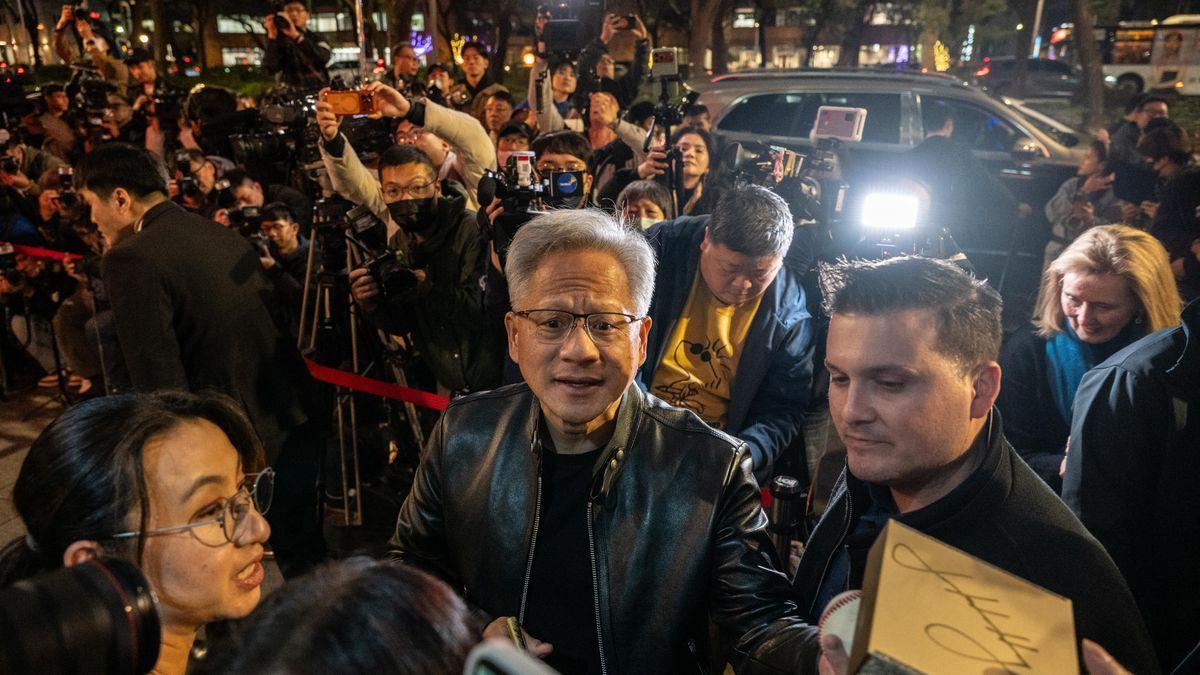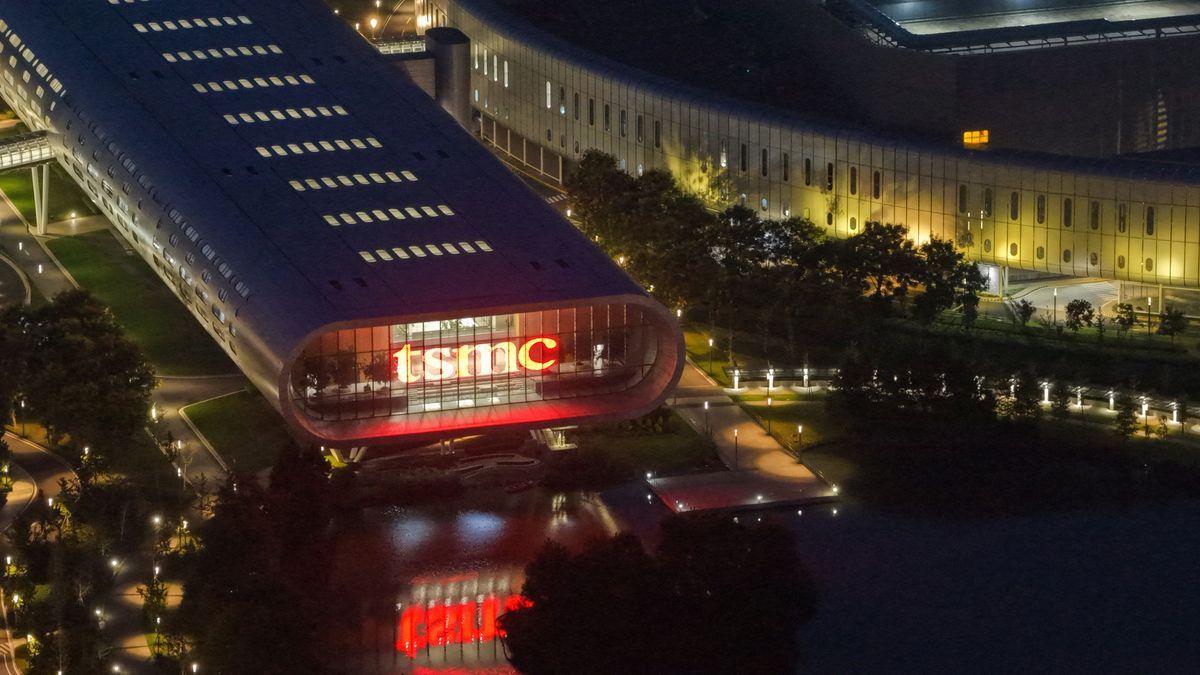NVIDIA CEO Jensen Huang Secures 50% Production Boost from TSMC Amid Soaring AI Chip Demand
3 Sources
3 Sources
[1]
NVIDIA's unstoppable AI chip demand has TSMC boosting 3nm production by a huge 50%
TL;DR: NVIDIA CEO Jensen Huang has requested TSMC to boost 3nm chip production by 50% to meet rising demand for Blackwell AI GPUs and Rubin AI platforms. This expansion highlights NVIDIA's reliance on TSMC's advanced semiconductor fabs as both companies prepare for increased AI chip manufacturing in 2026. NVIDIA CEO Jensen Huang has asked TSMC to increase its 3nm production by 50% as demand for the company's Blackwell AI chips continues to swell, as the groundwork is being laid down for its next-gen Rubin AI GPUs. Jensen is in Taiwan right now, where he was hanging out with TSMC founder Morris Chang, where he praised the country and TSMC, saying: "without TSMC, there would be no NVIDIA today". Jensen has visited TSMC's new Tainan 3nm semiconductor fab, while also visiting Hsinchu to participate in TSMC's annual sports day. TSMC has fresh new additional orders for NVIDIA AI chips fabbed on its 3nm process, which will require TSMC to expand the production capacity of its 3nm process fabbed at its Southern Taiwan Science Park 18B fab, increasing from the current 100,000 to 110,000 wafers per month, to 160,000 wafers per month. This is a huge increase of 45% to 50%, with NVIDIA's additional monthly wafer requirements at around 35,000 wafers. NVIDIA will need as much of TSMC's 3nm production capacity, as it wasn't long ago we were reporting that TSMC's 3nm and 5nm production was expected to be "100% booked out" in 2026, with more on that story in the links above. Additionally, NVIDIA's new Blackwell Ultra GB300 AI chips and new Vera Rubin AI platform are both fabbed on TSMC's N3P process node, so things are looking super-busy for both companies as we flow into 2026.
[2]
TSMC Chief CC Wei Says Nvidia CEO 'Wants More Chips' As Jensen Huang Enjoys Hotpot In Taipei And Praises The Taiwanese Foundry: 'No TSMC, No Nvidia' - Samsung Electronics Co (OTC:SSNLF), NVIDIA (NASDAQ:NVDA)
During his latest trip to Taiwan, Nvidia Corp. (NASDAQ:NVDA) CEO Jensen Huang strengthened ties with longtime manufacturing partner Taiwan Semiconductor Manufacturing Co. (NYSE:TSM), blending business with camaraderie over a hotpot dinner in Taipei. Huang's Taiwan Visit Centers On Strengthening Nvidia-TSMC Partnership On Friday, Huang, on his fourth trip to Taiwan, met with TSMC CEO CC Wei after a string of meetings last month with top South Korean executives, including Samsung Electronics Co. (OTC:SSNLF) Chairman Lee Jae-yong and Hyundai Motor Group Executive Chairman Euisun Chun. He met Wei over a hotpot dinner in Taipei, videos of which quickly became viral on social media. Speaking in Taiwan, Huang highlighted the chipmaker's indispensable role in Nvidia's success, saying, "No TSMC, no Nvidia." He added that the company's AI chip demand is accelerating "month by month," prompting him to request additional wafer supply from TSMC. See Also: Tesla's $1 Trillion Illusion: Elon Musk's Pay Package And The Robotaxi Myth Jensen 'Wants More Chips,' Says TSMC Chief -- But Keeps Details Confidential When asked by local media about what Huang discussed during his visit, Wei said that the Nvidia CEO "wants more chips." Pressed on how many chips Nvidia requested, the TSMC chief smiled and said, "That's confidential," reported Money UDN, one of the leading media platforms in Taiwan. Wei also revealed that TSMC has once again set records for both revenue and profit this year, expressing confidence that not just this year, every year from now will set a new record. AI Boom And Export Tensions Shape Nvidia's Strategy Huang's praise for TSMC comes amid heightened geopolitical tension after U.S. President Donald Trump announced restrictions on exporting Nvidia's advanced Blackwell AI chips abroad, citing national security concerns. The Blackwell series remains central to Nvidia's growth strategy, with analysts estimating it could generate $5 billion to $6 billion in revenue next quarter. Benzinga's Edge Stock Rankings place the chipmaker in the 98th percentile for Growth and 92nd for Quality, underscoring its strong performance compared with industry peers. Read More: Tesla Investor Ross Gerber Says 'Super Sad' To See Federal EV Subsidies End: 'Credits Created...' Photo: jamesonwu1972 on Shutterstock.com Disclaimer: This content was partially produced with the help of AI tools and was reviewed and published by Benzinga editors. NVDANVIDIA Corp$190.201.13%OverviewSSNLFSamsung Electronics Co Ltd$65.2154.0%TSMTaiwan Semiconductor Manufacturing Co Ltd$288.57-0.23%Market News and Data brought to you by Benzinga APIs
[3]
"No TSMC, No NVIDIA," Stresses CEO Jensen Huang as He Highlights the Importance of the Taiwan Chip Giant for the AI Industry
NVIDIA's CEO was spotted at TSMC's "Sports Day" today, and while addressing the public, Jensen stated that without TSMC, NVIDIA wouldn't have been in the dominant position it currently is. Jensen is currently on his fourth visit to Taiwan this year alone, and every time, his meeting with TSMC's executives is always followed by 'appreciative' comments. On the attendance of the Taiwan giant's sports event, NVIDIA's CEO Jensen Huang claimed straightforwardly that "without TSMC, there would be no NVIDIA today", praising not only the firm's executives, but also workers and professionals involved in fueling Team Green's semiconductor demands. One of the main reasons behind Jensen's visit to TSMC this time is to secure additional Blackwell chip wafers, as we reported yesterday. NVIDIA faces a massive demand for its current product offerings, which primarily consist of chips and rack-scale configurations within the Blackwell series. To meet the enormous demand, NVIDIA has requested that TSMC allocate additional chip production capacity. Along with this, Team Green is expected to be a primary customer of the 3nm process, securing around 30% of the total production, which shows that the AI bandwagon is moving with full force. The statement "No TSMC, no NVIDIA" does seem a bit dramatic when you look at it for the first time, but once the supply chain is analyzed, there's no doubt that the Taiwan chip giant is at the center of NVIDIA's AI business, whether it includes supplying necessary semiconductors or even advanced packaging services like CoWoS. More importantly, Team Green initially had been one of the 'late adopters' of cutting-edge chip technologies, but now the firm is racing to get its hands on advanced chips like the A16, implying that TSMC's importance will only grow. NVIDIA needs to keep TSMC 'close' to itself, given that the firm is one of the most sought-after in the AI industry. And, with Jensen's continued visits to Taiwan, it appears that the NVIDIA-TSMC relationship will evolve significantly moving forward.
Share
Share
Copy Link
NVIDIA CEO Jensen Huang visits Taiwan to strengthen partnership with TSMC, securing a massive 50% increase in 3nm chip production to meet exploding demand for Blackwell AI GPUs and future Rubin platforms.
NVIDIA Secures Massive Production Increase from TSMC
NVIDIA CEO Jensen Huang has successfully negotiated a substantial 50% increase in Taiwan Semiconductor Manufacturing Company's (TSMC) 3nm chip production capacity during his latest visit to Taiwan
1
. The expansion will boost TSMC's monthly wafer production from the current 100,000-110,000 wafers to 160,000 wafers per month at its Southern Taiwan Science Park 18B fabrication facility, with NVIDIA requiring an additional 35,000 wafers monthly to meet surging demand for its Blackwell AI GPUs1
.
Source: TweakTown
Strengthening Strategic Partnership Through Personal Diplomacy
Huang's fourth visit to Taiwan this year has been marked by a blend of business negotiations and relationship-building activities
2
. The NVIDIA CEO met with TSMC CEO CC Wei over a hotpot dinner in Taipei, with videos of their meeting quickly going viral on social media2
. Huang also attended TSMC's annual sports day and visited the company's new Tainan 3nm semiconductor fabrication facility, where he met with TSMC founder Morris Chang1
.
Source: Wccftech
"No TSMC, No NVIDIA" Declaration
During his Taiwan visit, Huang made a striking declaration about TSMC's importance to NVIDIA's success, stating "without TSMC, there would be no NVIDIA today"
1
3
. This statement underscores the critical dependency NVIDIA has developed on TSMC's advanced semiconductor manufacturing capabilities, particularly for its AI chip production3
. When pressed by local media about the specifics of their discussions, TSMC CEO Wei confirmed that Huang "wants more chips" but kept the exact details confidential2
.
Source: Benzinga
Related Stories
Preparing for Next-Generation AI Platforms
The production capacity expansion is being driven by demand for both current and future NVIDIA products. The company's Blackwell Ultra GB300 AI chips and the upcoming Vera Rubin AI platform are both manufactured using TSMC's N3P process node
1
. NVIDIA is expected to secure approximately 30% of TSMC's total 3nm production capacity, highlighting the scale of the AI chip demand and NVIDIA's dominant position in the market3
.Market Context and Future Outlook
This production increase comes at a time when TSMC's 3nm and 5nm production capacity is expected to be "100% booked out" in 2026, indicating the intense competition for advanced semiconductor manufacturing
1
. TSMC CEO Wei expressed confidence that the company will continue setting revenue and profit records, stating that "not just this year, every year from now will set a new record"2
. The Blackwell series remains central to NVIDIA's growth strategy, with analysts estimating it could generate $5 billion to $6 billion in revenue next quarter2
.References
Summarized by
Navi
Related Stories
Nvidia CEO warns TSMC must double capacity as AI demand threatens to overwhelm chip supply
01 Feb 2026•Business and Economy

Jensen Huang heads to Taiwan to launch Nvidia headquarters and host trillion-dollar dinner
05 Jan 2026•Business and Economy

Tesla Eyes Massive Chip Manufacturing Plant as Musk Considers Intel Partnership for AI Ambitions
07 Nov 2025•Business and Economy

Recent Highlights
1
Google Gemini 3.1 Pro doubles reasoning score, beats rivals in key AI benchmarks
Technology

2
Meta strikes up to $100 billion AI chips deal with AMD, could acquire 10% stake in chipmaker
Technology

3
Pentagon threatens Anthropic with supply chain risk label over AI safeguards for military use
Policy and Regulation





